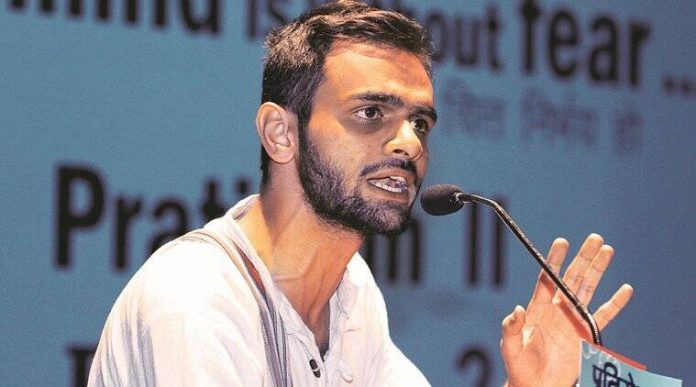The court held that protests against the contentious citizenship legislation and subsequent ‘chakka jam’ (blockade) was part of a “premeditated” conspiracy.
TCN Staff Correspondent
NEW DELHI — Smith, Saturn, Romeo, Neon, Juliet, Helium, Hotel, Helium, Gama, Echo, Crypton, Bond Bravo. The statements of these “protected witness” have been heavily relied on by the Delhi High Court while denying bail to former Jawaharlal Nehru University (JNU) student Umar Khalid – who had emerged as a prominent face of the historic anti-CAA (Citizenship Amendment Act, 2019) protests in early 2020.
The court on Tuesday (October 18) held that protests against the contentious citizenship legislation and subsequent ‘chakka jam’ (blockade) was part of a “premeditated” conspiracy, which led to communal violence in North East Delhi in February 2020.
Over 53 people (two-thirds were Muslims) were killed and properties worth crores of rupees were destroyed in the riots, which were chiefly caused by Hindu mobs – attacking Muslims, in the Trans Yamuna region of the national capital in six days (February 23-29, 2020).
Khalid, who has already spent 765 days in jail without trial, along with 17 others, which include Jamia Millia Islamia and JNU students, activists and an ex-Aam Aadmi Party leader, have been chargesheeted in FIR No. 59/2020 (larger conspiracy case) by the Delhi Police Special Cell under different provisions of the Indian Penal Code (IPC) and stringent Unlawful Activities (Prevention) Act, 1967 or UAPA.
A division bench of justices Siddharth Mridul and Rajnish Bhatnagar rejected in its entirety Khalid’s appeal against the denial of bail by a sessions court in Delhi. It upheld the lower court’s order on the following grounds:
1. The charges against the appellant are found to be “prima facie true” despite the many contradictions and discrepancies amongst the statements of the protected witnesses against him as these statements have not been cross examined yet.
So, according to the logic of the decision, while the contradictions in the statements may well be present (both the judges too have not denied it) since it has not yet been examined as evidence in a trial that has not yet begun, it will be considered irrelevant.
To put it simply, even if lies are lies, it will be taken as truth.
At the stage of bail, the court said, the statements of all the witnesses have to be taken at face value and their veracity can only be tested at the time of cross-examination during trial.
Khalid’s counsel Senior Advocate Trideep Pais had argued during the bail hearing the statements of the witnesses are either false, being delayed or contradictory/concocted/coerced and should not be relied upon.
2. The expression “revolution”, if not prefixed by the term “bloodless”, must be seen as a call for violence.
And since Khalid did not contradict either Maxmillien Robespierre or Jawaharlal Nehru while extending “Inqilabi Salaam” (Revolutionary Salutations) and “Krantikari Istaqbal” (Revolutionary Welcome) during his speech in northeastern Maharashtra town of Amravati where he called for peace and non-violence, the allegation that he was actually calling for violence, while extending these greetings, must be upheld.
And hence, bail must be denied.
Khalid in that speech had referred to the principles of civil disobedience and non violence, the persecution of Muslims since the Bharatiya Janata Party (BJP) came to power in 2014, the psyche of the minority community and the impact of Muslim women of Shaheen Bagh on anti-CAA agitations.
But the prosecution could only find reference of lynchings of Muslims in the speech.
During the hearing of his bail plea, the court had raised questions about the use of terms “karantikari Istiqbal” and “inqalabi salam” in the beginning of the speech.
His lawyer had replied that the revolution could be non-violent, and no violence took place immediately after Khalid’s Amravati speech.
Unimpressed with the submission, the court had observed revolution by itself is not always bloodless and that is why a prefix – bloodless – is used with the term “bloodless revolution”.
The court had also observed revolution does not have to affect only immediately.
“This court is reminded of that although the activity of ‘revolution’ in its essential quality may not be different but from the point of view of Robespierre and Pandit Nehru, in its potentiality and in its effect upon public tranquility there can be a vast difference,” said the high court in its 52-page judgment.
3. The burden of proof for culpability under UAPA is lighter than in normal criminal law; and therefore, the court needs not exert itself to work under normal evidentiary parameters.
In nut shell, a bad law makes the task of writing a bad judgement easier.
Khalid was arrested by the Delhi Police in September 2020 and charged with criminal conspiracy, rioting, unlawful assembly as well as several sections of the UAPA.
He has been in prison since then.
The Sessions Court had rejected his bail earlier. The Delhi High Court had reserved its verdict on September 9 after hearing the two sides at length for over 20 days.


